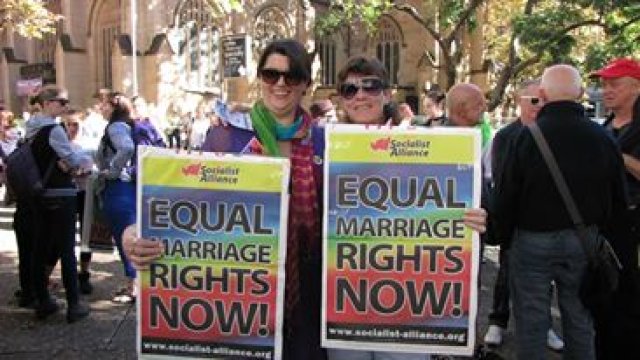
It is often said young people do not care about politics. A survey by the Australia Institute in July found that more than one million young Australians under 25 feel that no political party represents them. On top of that, 45% of respondents also said they were “disinterested” or “not really interested” in the upcoming federal election.
It is not hard to imagine why young people might be switching off when neither of the two big parties is dealing with the issues young people are most concerned about.
Further research by the Australia Institute has found the biggest political issues for young Australians were housing, jobs, marriage equality and university funding.
But Labor and the Coalition are responsible for blocking progress in these areas.
Young people want politics to be a space where they can engage and take action on issues they care about. They want political parties that are genuine, honest and democratic in their attempt to put forward solutions to the problems they see in the world.
Instead, they see two big parties that are not connected with ordinary people, that are seething with corruption and dishonesty. These two parties look only to opinion polls and will do anything to manipulate the public in their favour, as PM Kevin Rudd’s recent shift to the right on asylum seekers showed.
Young people see this and become disillusioned, struggling to understand why it is like this.
Capitalist democracy
In Australia, people vote every few years and have some rights to freedom of speech and other basic democratic rights. But how much say do the majority of Australians actually have over running society through political institutions?
Under capitalism, a system where the majority of people work for the profits of a tiny few, democratic control of society is more abstract than real.
Both Liberal and Labor push a pro-business agenda aimed at attacking the gains of working people and rolling them back. Although it is the Australian people who vote, the Liberal and Labor parties work for the capitalist class.
The capitalist class is a tiny number of people who have the majority of control over the Australian economy through ownership of companies and shares — people like Gina Reinhart and Rupert Murdoch.
Their economic power translates into political power through donations to political parties, control of the media and control of investments that allow them to have more control over what happens in the economy.
But their biggest strength is in the parliamentary structure, where no matter which big party you vote for, the capitalists are guaranteed to have an ally that will push their agenda — an agenda of attacks on workers’ rights, cutting social services and destruction of the environment, all in the name of making ever more profits.
As ordinary members of the working class, although we may be the majority, we do not have the same economic and political resources to influence politics. If a politician does not represent the people they were elected by, there is no means to recall that politician.
There is a reason that democracy under capitalism is limited and alienating. Because if there was truly genuine political democracy directly involving the majority of people, it might lead to calls for some form of economic democracy, calls that would place the wealth and power of the capitalist class under threat.
People power
Young people need to understand that while power currently lies with the major parties and their corporate sponsors, the only reason that remains the case is because the majority of Australians have yet to challenge it.
The majority hold the real power to create revolutionary alternatives that can build a genuinely democratic and equitable society. So how can we start creating that alternative?
Become involved in grassroots social movements for the issues you care about. The campaign for marriage equality is a prime example of what this can achieve.
In 2003 only 37% of people supported marriage equality, but now more than 60% support it. It was the work of grassroots activists, mainly young people, who changed the debate on this issue in Australia.
Through a sustained campaign that involved marching, protesting and drawing in more people, this movement changed the opinions of millions of Australians and put real pressure on the political establishment.
Even though it might not appear so, as workers, young people have a large amount of power to change society, whether you work at Woolworths, a bar or McDonald’s.
This is because your work and the collective work of all the working class is where the capitalist class gets its profits, and hence its power. Young people should actively organise in trade unions to defend their wages and conditions, while also seeking to advance them.
This will give us knowledge in organising and a better understanding of the importance of the role we play as workers under capitalism. Young workers should organise in the current unions, but must be wary of the bureaucracy and undemocratic structures of many unions that will seek to strangle grassroots organising. We must organise our workplaces, fight against the boss and push our unions to be more democratic and militant.
Students also have a very important role to play in fighting for a better society. It was students who played a major role in the Arab Spring and it was students who have led fights against austerity measures in Europe.
In Australia, students can work to build a strong and democratic movement that can stop the federal government’s cuts to university funding and courses.